A LONGER TABLE is a generative exhibition curated by Heather Jones and Sally Müller at Köttinspektionen in Uppsala, in collaboration with artists Ami Kohara, Erik Sjödin and Jacek Smolicki. Through shared curatorial research, Jones and Müller investigate the notion of hospitality in contemporary art generally, and within the context of a community art space specifically. In the midst of an ever-quickening pace of life, mass global relocation, conflicts around identity and belonging, and frantic searches for history, community and connection, this project is a first step in the exploration of hospitality as a concept and how it might be adapted for contemporary art and its relationship to its audiences and the community at large. Stemming from critical concerns regarding how the arts can exist as a vital part of society, the collaborative project questions how community and connection might be formed and strengthened through the arts, and how the arts might be integrated with other disciplines to form a more holistic understanding of life on earth today. Predicated on the idea that the methodology of the artwork and presentation must also be hospitable, this exhibition is envisioned as an embodiment of the idea of "a visit." Jones and Müller have worked together with Köttinspektionen and Stockholm-based artists Ami Kohara and Erik Sjödin to create a collaborative exhibition, series of inclusive workshops, open-ended discussions, and an ongoing collection of related research material on hospitality across a wide variety of discourses. Taken together, the conceptual and practical framework of A Longer Table invites conversations about inclusion/exclusion, belonging, community, our relationship to non-human beings, as well as potential problems of hospitality: discomfort, misunderstanding, cultural missteps, varying expectations and failure.
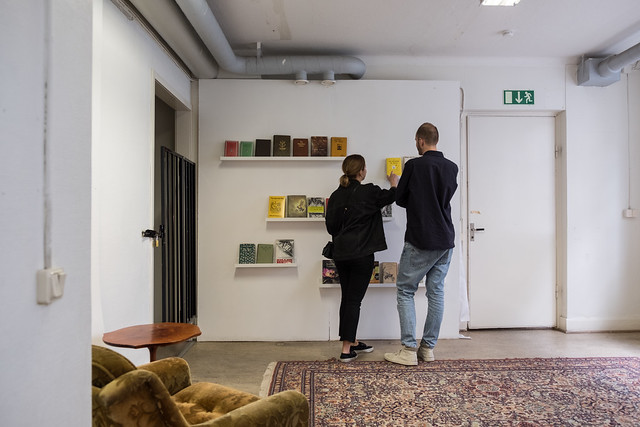
[The Political Beekeepers Library]
THE POLITICAL BEEKEEPER'S LIBRARY is an effort to collect, organise and activate books where parallels are drawn between how bees and humans are socially and politically organised. Bees are one of the most written about animals and have featured extensively in philosophy and literature. The books in the library show a fascinating narrative beginning with Aristotle's Historia Animalium (History of Animals) (4th century) to Charles Butler's The Feminine Monarchy (1609) to Thomas D. Seeley's Honeybee Democracy (2010). What starts as a story of a patriarchal monarchy ends with a tale of radical democracy. It can be argued that the authors, speculating on the life of bees, said more about the limits of their own human understanding than that of the life of bees - particularly bearing in mind most of the authors in the library are white, European men. Yet the aspiration for humans to learn from this sophisticated species runs throughout the collection and we encourage you to sit a while, read and try and expand the human-centered perspective the authors have struggled to shift.
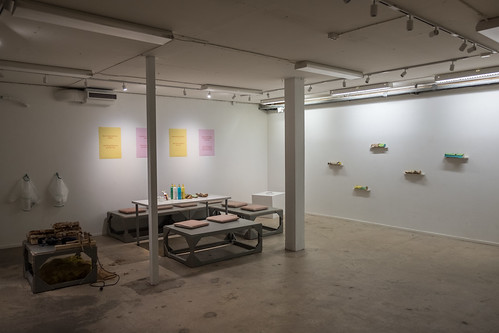
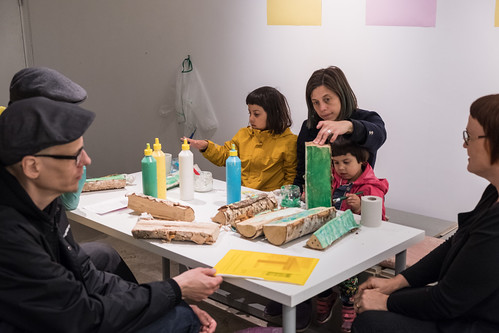
[Our Friends The Pollinators exhibition and workshop]
OUR FRIENDS THE POLLINATORS is an inclusive workshop for all ages focused on the construction and placement of homes for pollinating insects. Recent studies have shown that wild pollinators such as solitary bees, bumble bees and butterflies are critical for efficient pollination of food crops and wild flowers. Unfortunately many species of wild pollinators are endangered or extinct. One of several contributing factors to the demise of wild pollinators are the disappearance of their habitats and shelters.
In this drop-in workshop, visitors are encourage to build houses for solitary bees such as mason bees and leaf cutter bees by drilling and
painting wooden logs. The logs are then placed outdoors in a sheltered area with morning sun, for example on the south face of a house. The goal is for solitary bees to find and make the homes their own.
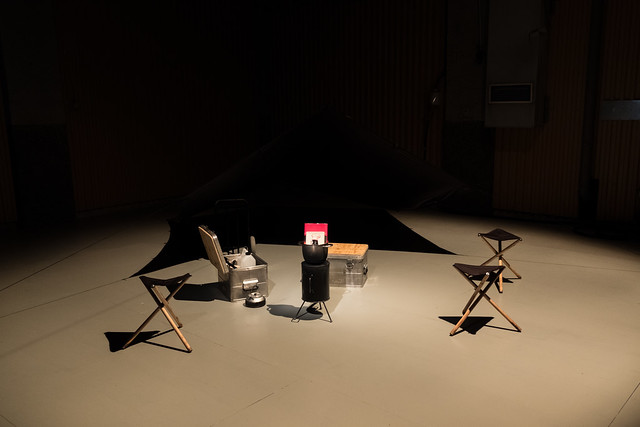
[Mobile kitchen for cooking Fire Soup]
THE FIRE SOUP KITCHEN is a mobile kitchen for cooking soup using a wood fired rocket stove. The kitchen is one of several mobile wood fired kitchens constructed within the project "We Still Carry The Fire" as a means of exploring human relationships to fire by providing various opportunities for social interaction and cooking.
The kitchen will be used for participatory cooking excursions throughout the exhibition period. Within the gallery space, the kitchen is presented along with books that highlight various aspects of humanity's long and complex relationship to fire.
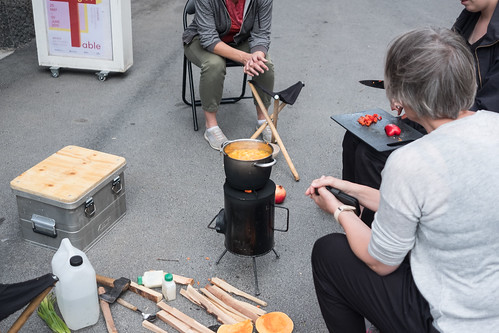
[Fire Soup Cooking outside Köttinspektionen]
A fire soup is a hot and spicy soup cooked over fire using primarily red-orange-yellow ingredients. In Swedish "a soup" is a metaphor for "a mess", thus a fire soup can be interpreted as a metaphor for the fire mess humans appear to have gotten themselves into. The pot with books about human - fire relations presented in the exhibition can be seen as a metaphor for an "intellectual soup".
NOTE: It is generally not permitted to make fires in densely populated areas or during hot and dry summer months. Before making a fire: 1. Check with the fire department if it is allowed to make fire. 2. Don't make fires if it's dry and windy. Fire can spread rapidly. 3. Always have fire extinguishing equipment close by. 4. Always be at least two persons, in case something should happen. 5. Make sure you can call for help if there is an accident.